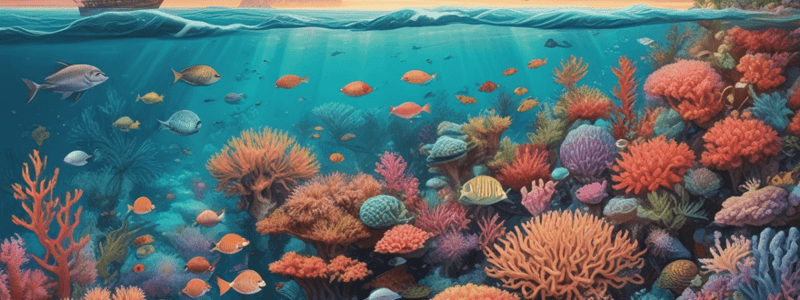Podcast
Questions and Answers
What are coral made up of?
What are coral made up of?
- Rocks with sharp edges
- Fish with colorful scales
- Tiny polyps with stinging tentacles (correct)
- Plants with green leaves
What do polyps secrete to create colonies?
What do polyps secrete to create colonies?
- Limestone skeletons (correct)
- Wooden structures
- Metal frames
- Plastic molds
What percentage of all marine creatures live in coral reefs?
What percentage of all marine creatures live in coral reefs?
- 50%
- 100%
- 75%
- 25% (correct)
What do coral reefs provide for young fish?
What do coral reefs provide for young fish?
What do coral get their rainbow of colors from?
What do coral get their rainbow of colors from?
Flashcards
Coral Structure
Coral Structure
Coral is made up of tiny polyps with stinging tentacles.
Limestone Skeletons
Limestone Skeletons
Polyps secrete limestone skeletons to create coral colonies.
Marine Biodiversity
Marine Biodiversity
25% of all marine creatures live in coral reefs.
Coral Habitat Role
Coral Habitat Role
Signup and view all the flashcards
Coral Colors
Coral Colors
Signup and view all the flashcards
Study Notes
- Coral are animals made up of tiny polyps with stinging tentacles.
- Polyps secrete limestone skeletons, creating colonies that act as a single organism.
- Coral reefs are some of the most diverse ecosystems on Earth, home to 25% of all marine creatures.
- Reefs provide rich habitat that helps protect young fish as they grow.
- Coral get their rainbow of colors from algae that live in their tissue.
- When coral become stressed, they evict their algae, resulting in coral bleaching.
- Coral's limestone skeletons form layers that reveal past ocean conditions.
- Climate change is putting coral's future in danger, along with millions of species and half a billion people that rely on reef fish for food.
- Warming waters result in prolonged coral bleaching that kill coral reefs or leave them vulnerable to other threats.
- Without significant action on climate change, our oceans could lose many of their colorful reefs by the end of the century.
Studying That Suits You
Use AI to generate personalized quizzes and flashcards to suit your learning preferences.




